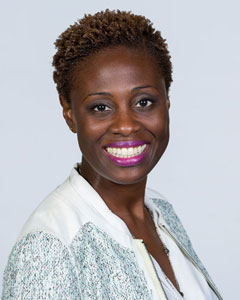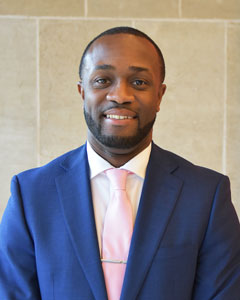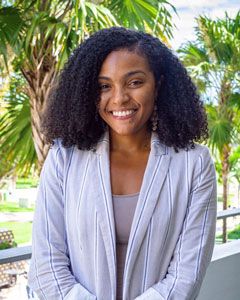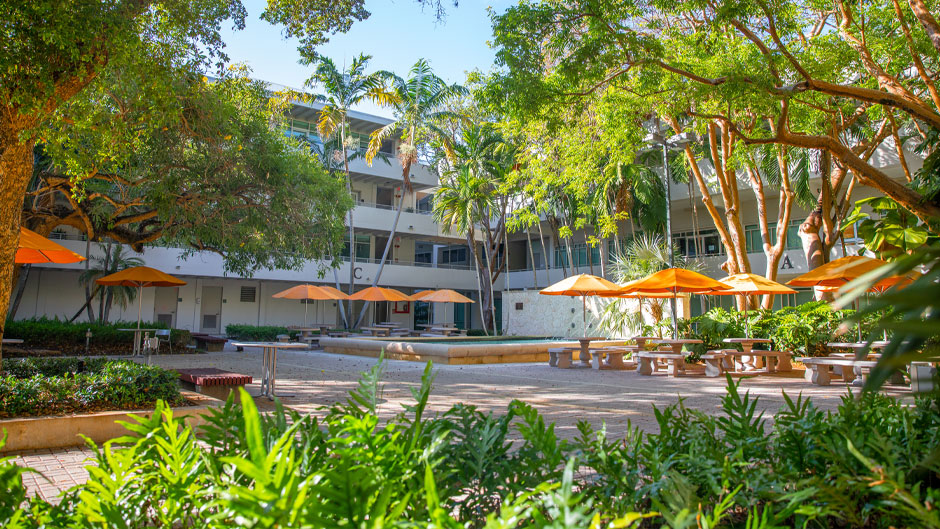The short video explained the link between housing and school segregation and described how the two actually play a major role in limiting access to higher education and wealth for certain segments of the population.
As University of Miami law student Danielle Alvarez watched the clip, she became astonished.
“It just made it so simple to understand why public education in low-income neighborhoods is the way it is and why the system we have today is so unjust,” Alvarez explained. “And as a mother, that really stuck with me.”
The video was just one of a series of exercises and activities that were conducted as part of a diversity in leadership training session for some 400 first-year School of Law students.
Racial and gender bias in the workplace; how a person’s identity can dictate the way in which they are treated in the legal system; how stereotypes and negative societal views are internalized; and the mass incarceration rates of Black males, who are much more likely to be arrested and convicted than their white counterparts, were among some of the topics discussed during the hour-long session, conducted via the internet.

“We didn’t tell students they had to think one way or another,” said Osamudia James, professor of law and the University’s associate provost for diversity, equity, and inclusion, who conducted the session in collaboration with Christopher Allen Clarke and Kennedy Robinson from the Office of Multicultural Student Affairs (MSA).
“We opened with language that told the students, ‘If you’ve already heard this, great. If you’ve heard it and disagree with it, that’s okay, too,’ ” James said. “But our goal was to help them understand the nature of inequality in our society and the steps they can take to create a more inclusive workspace, a more inclusive education place, a more inclusive living space.”
James, who is also associate dean for diversity, equity, and community at the School of Law, had the students participate in an exercise on the “reasonable person,” a phrase often used in tort and criminal law to indicate a fictional individual who exercises average care, skill, and judgment in conduct and who serves as a comparative standard for determining liability.
“Imagine what such a person would look like,” James told students. What typically happens, she said, is that people, without realizing it, “pick someone who looks like them or is familiar to them. So, the exercise made students realize there are concepts in the law that come with assumptions.”
When Alvarez closed her eyes to imagine a “reasonable person,” she saw herself, learning a valuable lesson in the process. “It made me wonder how that could hurt a client who didn’t look like the people in the jury box.”
While diversity training for first-year law students has been conducted in the past, the recent session marked the first time that MSA has partnered with the School of Law on a session.

“We were able to step out of our silo and break away from the notion that we work with undergraduates only,” said Clarke, director of MSA. “It’s important to build partnerships that create spaces for knowledge and skills for all students on campus. This session went a long way in helping the future legal professionals of this generation who will have the power to make meaningful and important change.”
Follow-up sessions will be held, breaking students up into smaller groups and digging deeper into topics introduced in the initial training. Future sessions, according to James, will also teach students how to integrate both their personal and professional identities. “Understanding values and what their roles and obligations are to their communities make for better lawyers,” she stated.
Diversity training is now becoming more common in law schools across the nation, but more such training is needed, James said. “Students are coming into the classroom and saying, ‘I’m reading cases, and I know that race, class, and gender are in the background, but no one is talking about it,’ ” James explained. “They’re saying they want to talk about it, that they want help in understanding how inequality around certain issues is shaping the law.”

For law student Tyler Bridgeman, the training session was “excellent beyond words.”
“It contextualized the long-held inequities that continue to pervade not only our judicial system but society at large,” Bridgeman said. “The session illustrated the gravity of inequities, while simultaneously explaining that the tools a law student acquires can directly address those inequities. I plan on applying what I learned from the session in conjunction with the legal tools I’ll acquire over the next three years to root out economic inequalities and foster a more just society.”
It was important to Mischaël Cetoute to participate in the training because he wanted to “gauge the University’s commitment to meeting the needs of historically underserved students and identify potential allies in the struggle,” he said. “It’s no secret that the student body is more racially, ethnically, and culturally diverse than most of our peers. However, this reality doesn’t necessarily mean that students are provided meaningful structures to bridge the cultural gaps that exist between groups. Sessions like this one help to start conversations that can bridge those divides.”
Students, said Robinson, assistant director of MSA, are “hungry for such sessions where the blinders come off. The students at UM now are part of a generation that is change-oriented and want to fix some of the problems that have existed for years and are now being uncovered during 2020. We’re equipping them with the tools to dismantle some of the obstacles they face in the world.”

